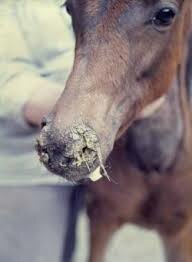Rattles in Foals
‘Rattles’ in foals is an infection caused by the bacterium Rhodoccus Equi. It is an extremely debilitating disease, sometimes with a high mortality rate, and has the potential to cause immense financial and emotional hardship – particularly in studs where large numbers of foals are bred.
|
|
The Rhodococcus Equi bacterium is a common soil dwelling organism which can live in the soil for approximately one year. It can be ingested from the pasture by the foal and it survives and multiplies in the foal’s gut. It can also be contracted by inhaling dust from the soil or from contaminated faecal particles, or by direct nose-to-nose contact with an infected foal. It is VERY infectious - particularly in young foals and can have a high mortality rate.
for approximately one year. It can be ingested from the pasture by the foal and it survives and multiplies in the foal’s gut. It can also be contracted by inhaling dust from the soil or from contaminated faecal particles, or by direct nose-to-nose contact with an infected foal. It is VERY infectious - particularly in young foals and can have a high mortality rate.
The disease commonly affects foals between one and six months of age, however research indicates that a foal may become infected from as early as birth onwards. Current studies also suggest that even though the foal may have contracted the infection, in some cases clinical signs may not be obvious until the foal is between 30 and 90 days old. Research by the Queensland Horse Council has shown that the prevalence of “rattles” and the mortality rate from the disease is approximately 28%. This not only represents a huge economic loss to the breeding industry, but the effect of the lung damage that can occur has a huge negative impact on the athletic performance of foals that do recover.
Although ‘rattles’ most commonly causes a severe broncho-pneumonia and lung abscesses it can also affect other body systems causing septic arthritis (infection of the joints), osteomyelitis (infection of bones), diarrhoea, inflammation of the lymph nodes, spinal cord abscesses and other immune related diseases.
Common Clinical Signs include:
- High temperature.
- Depression
- Thick greenish-white nasal discharge.
- Cough with typically "rattley" sound.
- Lethargy.
- Increased respiratory rate.
- Respiratory distress – with a “rattley” sound – hence the common name.
Treatment:
|
|
 Consult your veterinarian immediately you suspect that a foal has a respiratory problem. A prolonged course of antibiotic therapy is essential and should be continued for at least 30 days. Other systemic support, including intravenous fluid therapy, may be necessary for foals that are very ill and / or dehydrated.
Consult your veterinarian immediately you suspect that a foal has a respiratory problem. A prolonged course of antibiotic therapy is essential and should be continued for at least 30 days. Other systemic support, including intravenous fluid therapy, may be necessary for foals that are very ill and / or dehydrated.
Good management strategies may help to minimise the impact of this disease.
Prevention:
Not all foals will develop the disease even though they may have been exposed to the bacteria. It may be a combination of the strength of the foal’s immune system being able to combat the disease as well as farm/stud management practices to reduce dust that can help to minimize the impact.
Because foals mainly contract the disease by inhaling / ingesting contaminated dust the key to preventing infection is careful farm management and attention to animal hygiene.
- Maintain foaling paddocks with a good pasture cover.
- Avoid keeping foals in dusty yards.
- Irrigation of pastures & damping down of holding yards to minimise dust.
- Avoid overcrowding of foaling paddocks.
- Remove manure daily to reduce faecal contamination of pasture in foaling paddocks.
- Rotate and spell foaling paddocks.
- Monitor the temperature of young foals daily.
- Ensure that foals have an adequate volume of colostrum from the mare.
- Give foals an IGG test at birth and treat with plasma if they do not have a sufficient level of immunoglobulins (antibodies) in the blood.
- Isolate suspect cases from other foals.
Once the disease becomes established on a property it can be difficult to treat – so the old adage ‘prevention is better than cure’ is certainly true of ‘rattles.’
REMEMBER – For a stud manager or individual owner it is management strategies that are most likely to influence the prevalence of the debilitating disease ‘rattles’ on a property.

|
|
|
|
